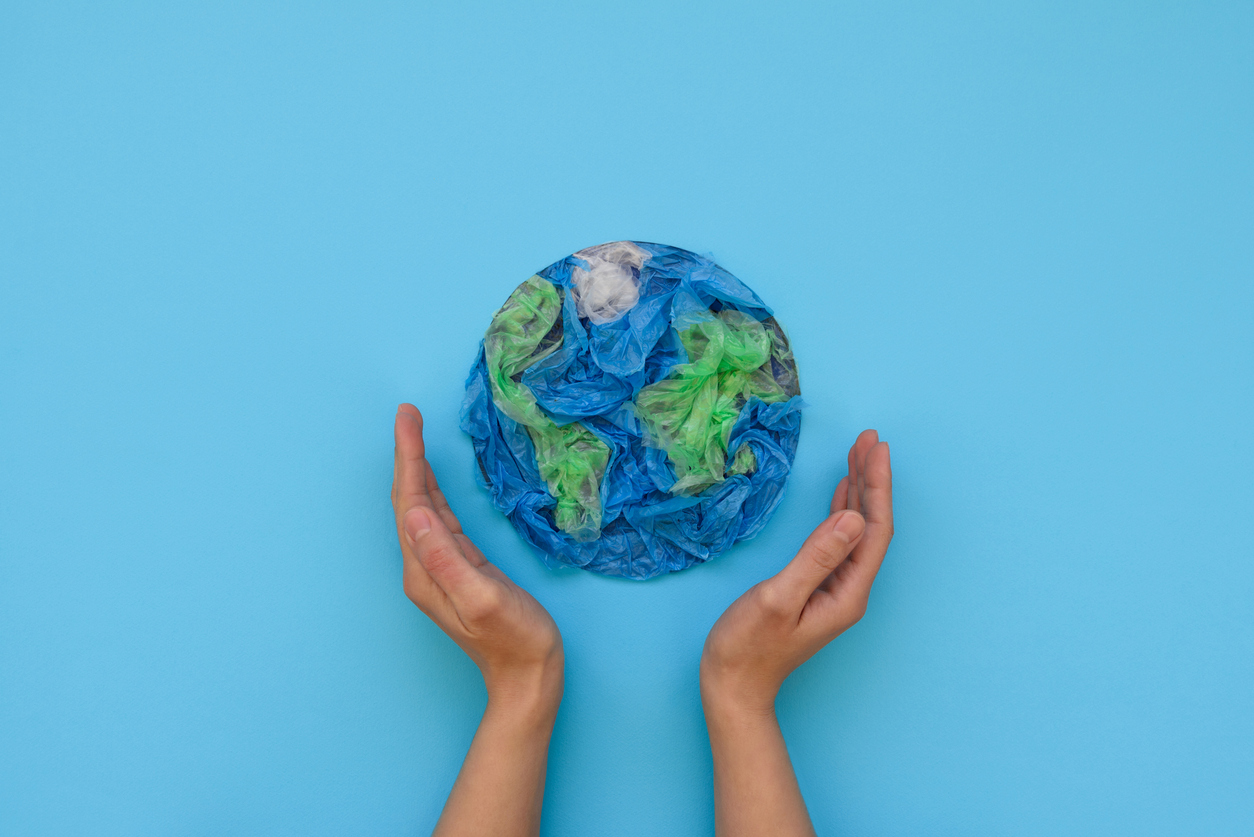How to inspire a plastic free revolution

After 10 years in the business, Yacht Chef Alexis Garrison has witnessed the tides of change in attitudes towards plastic within the yachting industry. So we asked her to share her unique perspective and that of the superyacht crews who are working to ignite a plastic-free revolution.
A GROWING INDUSTRY
With over 50,000 yacht crew worldwide and a global market expected to reach 74.7 billion US dollars by 2022, the yachting industry shows no signs of slowing down anytime soon. The Ellen McArthur Foundation estimates that by 2050 plastic will outweigh fish in the ocean, causing irreparable damage to ecosystems around the world.
These two sets of figures are not mutually exclusive- the ocean is the superyacht industry’s office. It is the reason we exist. Therefore we are not only obligated to protect it, but also well positioned to inspire and provoke change in plastic practices that preserve our treasured oceans.
Successfully implementing changes onboard that reduce the use of plastic (and more importantly single-use plastic) onboard starts with yacht crew. So Clear Ocean Pact asked me to weigh in on the challenges crews are facing in their efforts to go plastic-free. Can we build a supportive and successful community of plastic-free pioneers?
A GLOBAL CHALLENGE
I have recently celebrated my tenth year in the yachting industry. The travel and allure of the industry is a draw for most crew, but the damaging effects of plastic pollution from the South Pacific to the Azores and beyond is alarming. I am always captivated by the culture and landscapes of the places I travel to, but no matter how far I venture I am often shocked to find that even the most remote places are extremely dependent on plastic.
When Sailing into the Galapagos, crews have to work through a few protocols in order to protect the local ecosystem but then, walking the streets of the Galapagos’ Santa Cruz Island, you’ll find rows of shops selling plastic home goods imported from China. Frustration is not the right word for this plastic catastrophe. How can we tackle this? How can we as a yacht crew make long-lasting changes to stop plastic pollution in its tracks and prevent further damage?
CHANGE ISN’T EASY BUT IT IS POSSIBLE
Only in the past few years have I become fully committed to altering my ugly relationship with plastic. I’ve mainly been a freelancer on yachts and I find that my efforts to reduce or reuse have come under fire from the crews I work with on a continual basis. It’s tough, I get it. It’s not as easy as we want it to be. We work hard and working up the energy it takes to even begin, let alone maintain, a plastic-free environment, can be especially taxing.
Change isn’t easy but our trash bins have become an effective mask – a way to which we can shut our eyes to the plastic problem that is unfortunately taking over our oceans at an alarming rate. I have received eye-rolls and been laughed at for washing plastic wrap or Ziplocs. I have received flack for working hard to source ethical toiletries, that are made from long-lasting and environmentally-friendly materials. Having thick-skin is a must in this industry and so we can usually turn a blind eye to this lack of support. However there are definitely moments where throwing in the towel seems like the only way to make it through the day.
However, the current state of plastic pollution means this is not really an option. Through the challenges I have faced, I have become increasingly aware that the only way to truly pioneer change is through community. By creating a movement that brings crews together, shares information and supports practical changes we can change the world. Environmentally-conscious yacht crew are popping up everywhere and there are more than you think.
I reached out to a few conscious crew members to ask how their current efforts are being received and to discuss the challenges we are collectively facing. Here’s what they said.
GOING PLASTIC FREE: A CONSCIOUS CREW PERSPECTIVE
Alison Foley spent 8 years working onboard and is the founder of TenLittlePieces.com an empowerment movement for children to take environmental stewardship of the places they love. She remains connected to yachting as one of the administrators of the popular Facebook group “Yacht Stewardess and Steward Tips” run by Super Yachting South Africa. She’s also recently been selected to join eXXpedition Round The World 2019-2021, an all-female voyage and scientific research mission to explore the causes and solutions of ocean plastic pollution, via four of the five oceanic gyres and the Arctic.
I asked Alison what first steps crew could take to initiate change onboard:
“Become aware. Stop and think. Assess your impact. Look for alternatives. Clean your dock. Pick up plastic. Working onboard can sometimes feel like you’re in a bubble. You’re not. We’re all connected.”
Alison added:
“Don’t doubt that you can make a difference. Research sustainable options, talk to fellow crew and share your successes. Every plastic toothbrush you replace with bamboo or plastic water bottle you choose not to use and add to land fill makes a difference. Every piece of plastic or debris you clean from your dock or beach trip before it reaches the water is one less that ends up in our ocean.“
On the challenges of encouraging fellow crew to adopt plastic-free practices, Chief stew Nicole Fowler says that the lack of support often stems from the “inconvenience” to separate recycling or the sad fact that “..some crew are so set in their ways and have no regard for how their consumption (especially single use plastic) affects the environment.”
Kirsty Sky, Captain of SY Delicia also shared her tips on how crew can start to make changes and encourage others to do the same:
“Give guests nicely embroidered bags for those shopping trips, make your own washing powder, softener and cleaning products. Its super easy. Stop using bottled water onboard completely, use refillable toiletry dispensers in the shower, separate trash and re-use as much as you can. It is amazing how useful those plastic meat trays can be in the engine room when doing oil changes for instance.”
LEADING THE CHANGE
A startling 55% of yacht crew and 79% of guests still drink bottled water onboard as identified by the survey Turn the tide on plastic, also on superyachts conducted by Marja Kok, a Captain and founder of waterwithoutwaste.org (WwW). Marja’s concerns for the environment led her to look for solutions to reduce plastic pollution whilst having the best drinking water on tap. This led to the development of a novel water purification system for onboard yachts.
WwW has since set up crew workshops on reducing plastic waste and on improving quality and knowledge around drinking water. They set up shop for the crewlounge at the Superyacht Show in Palma and the Superyacht Cup in Palma so that Captains and crew could sample the quality of water from the WwW water purification equipment. It was noted in comparison from the previous year that there was substantial growth in participants going plastic bottle free.
HOW CAN YOU IGNITE AN ONBOARD REVOLUTION?
Here are my 5 top tips in getting started.
Talk to your captain. Share your concerns and speak about how you might intitate simple changes. If your Captain is open to the idea of making small changes then see if a crew meeting could be held to build support within the crew. Discuss and play with a few ideas about how you can begin.
- Talk to your captain. Share your concerns and speak about how you might initiate simple changes. If your Captain is open to the idea of making small changes then see if a crew meeting could be held to build support within the crew. Discuss and play with a few ideas about how you can begin.
- Sign up to Clear Ocean Pact. Show your community that you are ready to change. By adopting the PACT you join a growing conscious yachting community, enabling you to build your own friendly support networks, share information and inspire others across the globe.
- Host a beach or town clean-up wherever you may be. Make new friends and increase awareness within the local community. Connecting with local communities in unique destinations is a special part of the work we do!
- Talk about guest services with your yacht’s owner. Are they open to changes? Provide facts and information about why reducing single-use-plastic onboard is so important. Have a list of viable alternatives ready (some can be found here!). Make a timeline that is aligned with your intended travel destinations so changes are manageable and realistic for you and your team.
- Keep talking about it. Making people aware that changes are possible is one of the most important things you can do consistently even when recycling or alternatives are not available. From suppliers to provisioners, the more you talk about why or how you’d like to spend your dollars it will be noticed.
